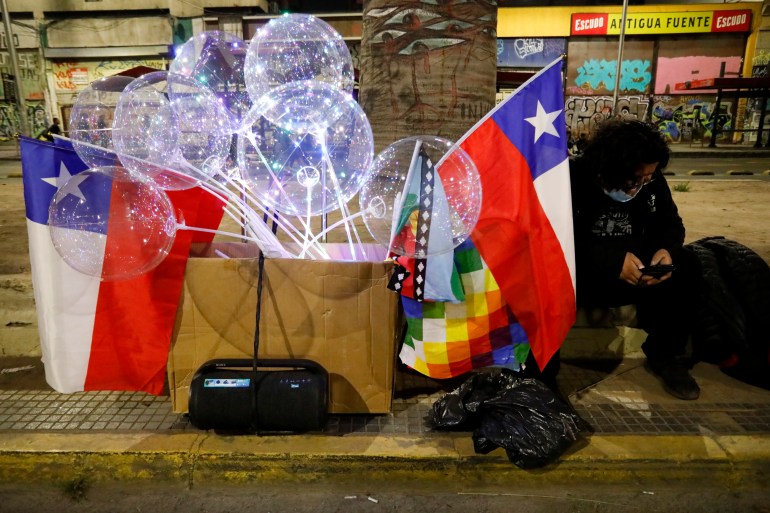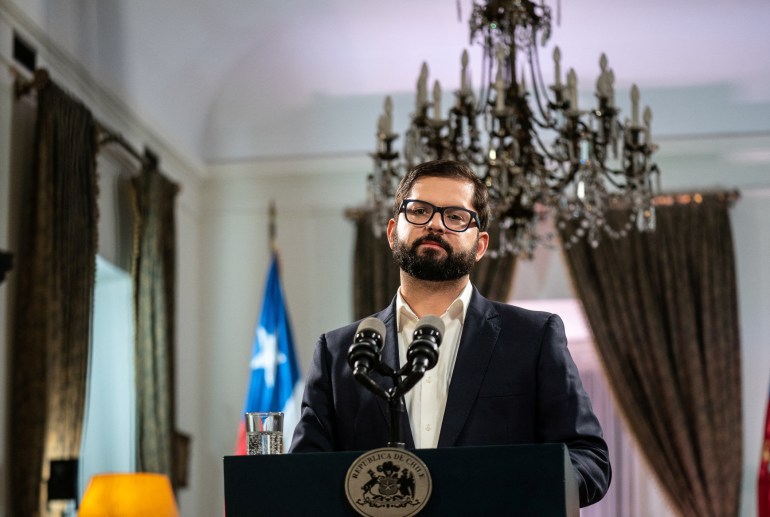‘Sense of abandonment’ as Chile rejects new constitution | Environment News
Lorena Donaire woke up on Sunday morning in her hometown La Ligua, in central Chile, with tears of joy. Confident that her country would vote to approve the proposal for a new constitution, she had planned to celebrate a new chapter in Chilean history which placed the environment as a key priority.
Donaire, 50, grew up in the drought-stricken zone Petorca, where La Ligua is situated. An environmental rights activist and spokeswoman for water rights group Modatima, the approval of the proposal meant the realisation of the rights she had fought for her entire life.
Several of her Modatima colleagues were elected to write the draft, enshrining landmark environmental protections and consecrating water as a fundamental right.
But when the results came in, her tears of joy turned to those of heartbreak. A majority 61.9 percent of Chileans voted against the text, firmly rejecting the ambitions of a proposal that dubbed itself feminist, ecological and groundbreakingly progressive.

Donaire told Al Jazeera that she feels “abandoned and very sad”, but will not lose hope. “We will continue to fight for the little water Chile has left.”
Demands for a new constitution arose during nationwide protests in October 2019, when millions of Chileans took to the streets to march against the rising costs of living, their anger directed towards an out-of-touch political elite.
The ruling constitution, written in 1980 during the dictatorship of conservative President Augusto Pinochet, was singled out as the root cause of the country’s gaping inequality and lack of social welfare. Many protesters, including Donaire, argued that Pinochet’s text gives private companies disproportionate power over civil and environmental rights.
In October 2020, Chileans voted by a landslide 79 percent to replace the 1980 charter and draft a new text written by 154 popularly-elected candidates. In May 2021, a largely independent and left-wing assembly was chosen to begin the drafting.
It was the world’s first constitutional proposal written by equal parts men and women, and it had reserved seats for Chile’s Indigenous groups.
However, the process was smeared by infighting, with opponents criticising constituents for prioritising leftist demands over wider, more representative solutions.
A new process
President Gabriel Boric had been supportive of the assembly; dozens of the proposal’s writers were members of his Broad Front coalition party.
The “Reject” victory signals a huge blow to his political agenda. A former left-wing student protest leader only months into his first government mandate, Boric’s ambitions to provide greater social security and prioritise the environment are blinkered by the framework of Pinochet’s ruling doctrine.
On Sunday night, Boric promised to lead the nation forward in a televised address. “The people of Chile were not satisfied with the proposal … and decided to clearly reject it at the ballots,” he conceded, before pledging to begin a new constitutional process.

“I will put all efforts into building a new constitutional itinerary together with Congress and the civil society … that learns from the process.”
Members of the opposition parties who led the “Reject” campaigns have similarly committed to writing another draft. “We have the space to build great agreements,” said centre-left Senator Ximena Rincon on Chilean television after the result. “It’s beautiful what happened today, and we won’t celebrate now, but when we finish this process,” said Luz Poblete Coddou, president of the centre-right Evopoli party at a separate news conference.
Jose Francisco Viacava, political scientist and academic at the government faculty of the University of Chile, said Boric must bring together a diverse team that includes political actors, opinion leaders, and the current Congress to reach a consensus for the process ahead.
“This goes far beyond the government, and it’s a task just as time-consuming, or even more time-consuming than running a country,” he told Al Jazeera. “To implement a new constitution means that everyone must be integrated in the process, to listen to the opinions of those who legitimately rejected it.”
Boric must also ensure that a new draft is communicated clearly and correctly: the dismissed proposal was besieged by an onslaught of fake news that fuelled “Reject” campaigns. False claims spread rapidly online, spreading misinformation that claimed that the text outlawed bottled water, permitted abortion up to nine months of pregnancy, and allowed the state to claim property and usurp homeowners.
The latter is why Adriana Rojas rejected the proposal. A mother who lives in the working class district of downtown Santiago, she took to the streets to celebrate the result on Sunday night with her two young children and her teenage niece. “The new proposal is not adequate, especially for children,” she explained, clutching a Chilean flag. “The text says that your house will belong to the government, when it should be for your children and grandchildren.”
In La Ligua, Donaire looks out onto a parched landscape. Petorca’s two main rivers are now completely dry; a result of unregulated agricultural companies cultivating avocados by pillaging the region’s water supply, as facilitated by Pinochet’s constitution.
Donaire has received dozens of anonymous threats, including phone calls and online intimidation. She said she believes that they come from actors paid by the agricultural industries because of her environmental work. In June, her house burned down under suspicious circumstances. The case is still being investigated.
Despite the danger, Donaire said she will continue to rally for the environment and hopes the next draft will incorporate protections for nature and its defenders. She believes that more Chileans will soon face the brunt of the environmental crisis, and drastic change is inevitable.
“When we first said there’d be no water in our rivers everyone thought we were crazy. But eventually, time showed that we were right.”
